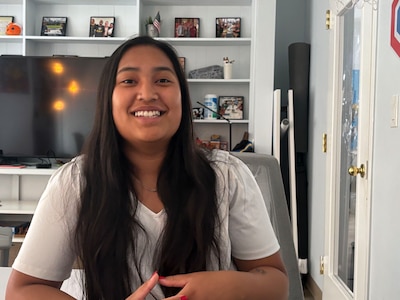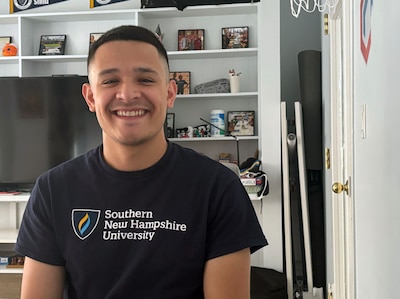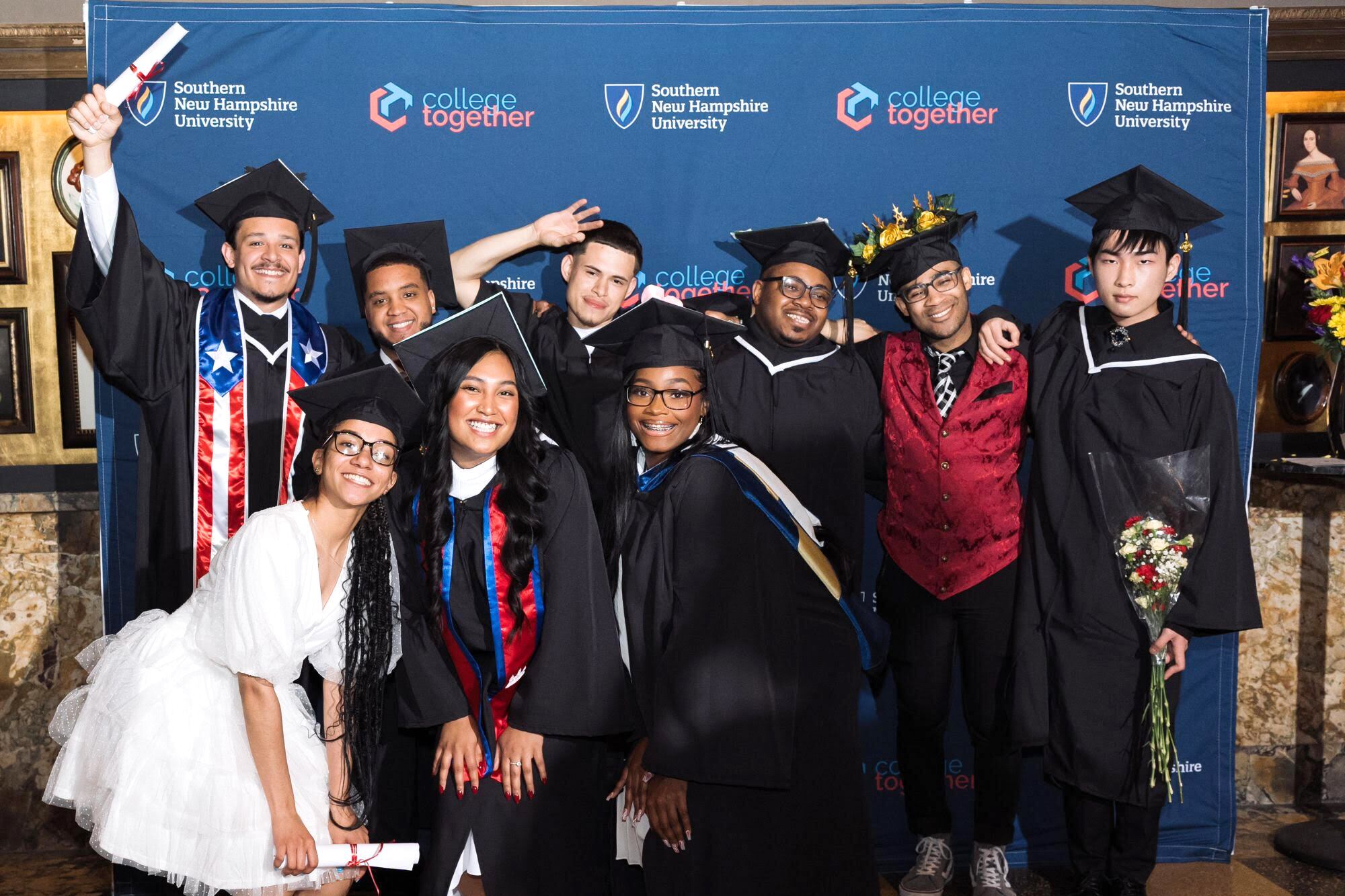Sign up for Chalkbeat Philadelphia’s free newsletter to keep up with the city’s public school system.
Sanya Sek worked hard in high school. She got all As, including in Advanced Placement courses. She applied to college and even got into Bryn Mawr.
But her parents, both of whom had fled the Khmer Rouge in war-torn Cambodia when they were young, could not afford college, even though they prized education. The financial aid she was offered fell short of covering all the costs, including room and board, books, and the myriad ancillary fees. So she enrolled instead in Community College of Philadelphia.
“I took the safer option,” she said. “I had hopes to get into a decent college, but I felt the hard work I put in didn’t get the result I wanted.”

But then Sek, 22, met Oscar Wang and discovered College Together, and a whole new set of doors opened for her.
Wang, 32, has worked since 2013 on mentoring first-generation students from Philadelphia to attend college. He started a group called Mentor for Philly while still a student at Haverford, which morphed into Philly College Team after he graduated in 2014.
But after working with dozens of students, he realized that most never finished their degree.
Mentorship, he reasoned, wasn’t enough. Enter College Together, which now has a staff of six, a spacious Center City office, and counts 21 college graduates who have passed through its program, including Sek and Rodriguez.
“It’s been a 10-year journey to answer a single question, how to get more Philadelphia students not just into, but through college,” Wang said. And not just through college, he added, but armed with marketable skills and free of debt.
Pursuing a degree through College Together is affordable – even no cost to students who qualify for Pell Grants. It has several partners, including the school district, the Mastery and KIPP charter networks, and foundations including the Philadelphia Foundation, Claneil Foundation, and the Samuel L. Fels Fund. Most crucially, it partners with Southern New Hampshire University’s Global Campus, an online school, through which students can earn their degree by doing a series of projects that develop real-world skills necessary to succeed in today’s job market.
While in the program, they can do their coursework from home or from College Together’s Center City office on Walnut Street, where they have access to one-on-one tutoring, laptops, research assistance and, often, food.
The help he needed to stay on track
MarcAngelo Rodriguez, 26, grew up on the mean streets of Kensington, stayed out of trouble, and graduated from Kensington Creative and Performing Arts High School in 2016. He enrolled in CCP, but left within a year. Then he tried training to be an automotive technician at Universal Technical Institute, a for-profit trade school.
When that didn’t pan out either, he worked different jobs – in retail, food services, security. His real goal was to be a police officer, and ultimately a detective.

Rodriguez heard about College Together and got in touch with Wang. Now both he and Sek possess college degrees they likely would not have attained otherwise. Sek is pursuing a career in communications, and Rodriguez has dreams of becoming a detective.
Typical students in Philadelphia, especially those in neighborhood high schools – mostly low-income young people of color – have been “undervalued, ignored, or overlooked by traditional institutions and structures” and needed an alternative path, Wang said. These are students “who need flexibility, for instance, so they are not punished for missing class because they had to babysit.”
He chose to partner with SNHU Global Campus because “it was built with working adults in mind,” Wang said. In establishing College Together, he discovered that in designing its online degree program, SNHU educators quizzed employers like Boston Children’s Hospital on what skills they look for, and “reverse engineered” their coursework with the goal of building student competencies. SNHU is accredited by the New England Commission on Higher Education.
Today, there are a dozen organizations around the country like College Together that work with SNHU in places like Los Angeles, Chicago, Detroit, and New Orleans. Together they form the Post-Secondary Success Collective.
“This is what they call the community-partner model,” Wang said, explaining that in order to access SNHU’s courses offered through its competency-based innovation lab, students have to go through a nonprofit.
The tuition is $2,333 a semester, and students can double-up on courses year-round without paying more money. He said that Mastery, for instance, touts the program as the only pathway in Philadelphia through which students can earn a bachelor’s degree for under the amount of a federal Pell grant – essentially making it free to them.
Students prize learning by doing
Sek’s parents pushed her to do well and were proud of her achievements, but their culture prioritized keeping her close over anything else, she said. For high school, she could have attended a top magnet school – she got into Central and Palumbo, among others. But her parents didn’t want her going far away – she had never even learned how to use SEPTA.
So she attended Mastery-Thomas, a charter high school that was a 5-minute walk from her South Philadelphia home.
It turned out to be a good choice, she said, with a small student body, caring teachers, and a dual-enrollment option that allowed her to earn college credits in high school. But she didn’t get much help with financial literacy – she didn’t understand loans, and her parents were all about “save money, save money,” she said. That’s how she ended up at CCP.
It wasn’t easy at first; she started during the pandemic year. Plus, despite excelling in AP courses, she was done with learning based on reading a textbook “and answering multiple choice questions … I was forcing myself to memorize everything and not retaining anything. The purpose of learning was not there for me.”
Things got better after she switched her major from liberal arts to business. After getting her associates degree, she figured she’d save money and attend a local school like Drexel or Temple. That’s when her high school adviser, with whom she kept in touch, told her about College Together.
The project-based approach to learning at SNHU suited her. While earning her degree in management, she could engage in real-world problem solving. In one scenario, she had to explain how she would de-escalate a conflict between two employees in a work setting. Another required her to set up a business plan for a new pasta restaurant in a neighborhood with a competitor just a few blocks away. To do that, she had to research demographics and develop an advertising pitch to build clientele. She relished these kinds of tasks. “They require critical thinking and emotional intelligence,” she said.
So she not only got her degree from SNHU, but convinced Wang to hire her as College Together’s first communications director.
Rodriguez made it through Kensington CAPA, appreciating its newly built campus, but also sometimes “acting like a dumb teenager who followed the crowd” and neglecting his studies. As a result, he wasn’t well prepared for CCP. While he aced courses that focused on his interest, criminal justice, he faltered in others, like English.
Plus, life happened: He got married and had a daughter.
In 2022, he said, “I did an evaluation of my life, I was still working in retail, I was 24 and I had a kid. I felt I was at a dead end … I knew I wanted a career, and I had ambitious goals for myself.” He had heard about College Together through a friend, “and Oscar invited me to join the program.”
It took him two years to get his degree from SNHU. During his college experience, he was determined to do well. Like Sek, he appreciated the real-world nature of the learning experience.
“Teachers were willing to put in the work to invest in me, and them investing in me made me want to invest in myself,” he said.
Now he is in the process of applying to the police department.
Dale Mezzacappa is a senior writer for Chalkbeat Philadelphia, where she covers K-12 schools and early childhood education in Philadelphia. Contact Dale at dmezzacappa@chalkbeat.org.






